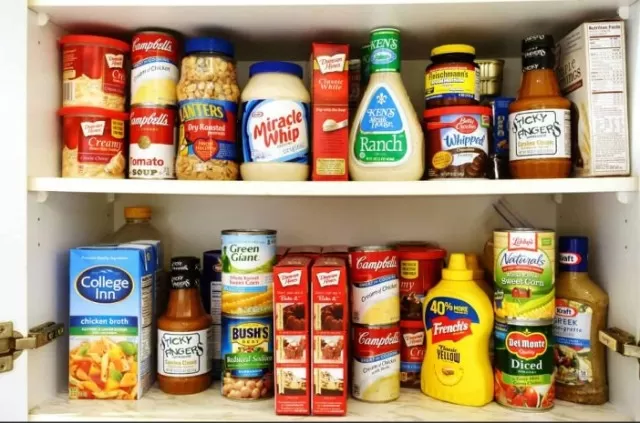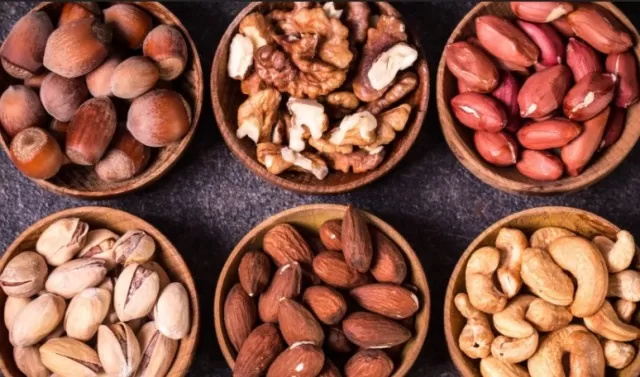Pantry No-Go’s: Foods Unsuitable for Storage. While the pantry serves as a reliable storage spot for many food items, not all edibles thrive in this environment. Some become victims of staleness, others fall prey to bacterial growth, and a few succumb to mold.
To ensure the longevity and safety of these delicacies, consider storing them elsewhereBy adopting the appropriate storage practices, you can ensure these edibles stay fresh, flavorful, and safe for your culinary adventures. Whether in the refrigerator, freezer, or a cool, dark cupboard, each delicacy will be ready to delight your taste buds whenever you desire.
Know Your Pantry: Unveiling the Secrets to Smart Food Storage

The pantry, a treasure trove of culinary delights, often becomes the go-to storage space for a wide array of foods.
However, appearances can be deceiving, as not all items fare well at room temperature. A whiff of moldy jelly, the sight of drippy prosciutto, or the taste of rancid oil can quickly remind us that proper food storage is essential.
While some people rely solely on label instructions, assuming that if it doesn’t say “refrigerate,” it belongs in the pantry, they may unknowingly be shortening the shelf life, compromising taste, and risking food safety.
In this article, we will delve into the intricacies of intelligent food storage, shedding light on items that are often considered pantry staples but should never be stored there.
We will explore the science behind food preservation, uncovering why certain products last longer, taste better, and remain safer when placed in the refrigerator or freezer, regardless of what the label suggests.
By understanding the factors that influence food spoilage and the optimal conditions for various items, you can ensure the longevity and quality of your pantry and kitchen staples.
Prepare to be amazed and, at times, surprised, as we uncover the secrets to maintaining a well-organized, efficient, and safe pantry that will tantalize your taste buds and keep your meals at their finest. So bid farewell to food waste and unwelcome surprises, as we equip you with the knowledge to become a pantry connoisseur, preserving and enjoying your food to the fullest.
The Perils of Homemade Garlic-Infused Olive Oil: A Cautionary Tale of Food Safety
Garlic-infused olive oil, a popular culinary delight, comes with an unexpected dark side that could pose serious health risks if not handled with care.
Despite its delectable flavor and versatility in cooking, this seemingly harmless creation may harbor hidden dangers that demand our attention.
The primary concern lies in the potential presence of botulinum spores within fresh garlic.
These spores have the capability to develop into the notorious Clostridium botulinum bacteria, which is responsible for causing botulism – a severe form of food poisoning that targets the nervous system and can lead to life-threatening consequences. While this might sound alarming, understanding the science behind it empowers us to take the necessary precautions.
When garlic is infused into olive oil, particularly without any heat treatment or preservatives, the anaerobic conditions (low-oxygen environment) within the oil can become conducive to the growth of botulinum bacteria.
As such, storing homemade garlic-infused olive oil at room temperature, even if it lacks any visible signs of spoilage, becomes a risky proposition.
To mitigate the danger, it is crucial to store garlic-infused olive oil in the refrigerator promptly.
The cooler temperature acts as a deterrent to bacterial growth, reducing the risk of botulism formation. However, even with refrigeration, it is essential to exercise caution and adhere to strict guidelines.
Discard any homemade garlic-infused olive oil after a maximum of 7 days to ensure your safety.
By being informed about the potential hazards and taking appropriate measures, you can continue to enjoy the wonderful flavors of garlic-infused olive oil without compromising your well-being.
Embracing food safety practices empowers us to indulge in our culinary passions responsibly, safeguarding ourselves and our loved ones from avoidable health risks. Remember, knowledge and prudence are the key ingredients to a safe and delightful gastronomic journey.
Safeguarding the Sweetness: Why Pure Maple Syrup Deserves a Spot in Your Fridge

Indulging in a delectable stack of pancakes smothered in pure maple syrup is a delightful treat that can brighten any morning.
Yet, once the feast is over, the question arises: where should this liquid gold be stored? The answer might surprise you, as pure maple syrup, especially the organic variety, demands special attention to maintain its delectable quality and prevent an unwelcome surprise.
Unlike its artificial counterparts, pure maple syrup is a natural product, which means it requires a bit more care in storage.
The pantry, while a seemingly convenient choice, may not be The Best Option. One crucial reason for favoring cold storage, specifically in the fridge, is the risk of mold formation.
Pure maple syrup, especially if it’s organic, can be susceptible to mold growth when kept at room temperature for extended periods.
By refrigerating your pure maple syrup, you provide it with a cool and stable environment, which hinders the growth of mold and ensures its freshness.
Moreover, cold storage helps preserve the syrup’s rich flavor and desirable consistency, making each drizzle a delightful experience.
Another factor to consider is the container in which the syrup is stored.
If it’s opaque or dark-colored, mold may lurk unseen until it’s too late – spoiling your breakfast with an unappetizing revelation. Keeping the syrup in the refrigerator, where it’s easy to inspect the contents, allows you to detect any signs of spoilage promptly.
So, next time you savor the deliciousness of pure maple syrup, remember to show it some love by granting it a well-deserved spot in your refrigerator.
Embrace the cold storage practice and enjoy a fresh and delightful culinary experience, free from any uninvited guests. Your pancakes, waffles, and taste buds will thank you for it!.
Preserving the Flavorful Elixir: The Importance of Refrigeration for Sunflower and Truffle Oil
In the realm of culinary delights, few things rival the exquisite taste of cold-pressed oils, particularly the golden goodness of sunflower oil and the luxurious aroma of truffle oil.
However, their premium status also comes with a price – a relatively short shelf life when not handled with care. To ensure you savor every last drop and make the most of these precious oils, refrigeration becomes a crucial ally in extending their usefulness.
Sunflower oil, extracted through a delicate cold-pressing process, boasts a distinct nutty flavor and a myriad of culinary applications.
The same process that elevates its taste also renders it susceptible to oxidation and rancidity when exposed to air, heat, and light. Refrigeration comes to the rescue, acting as a shield against these detrimental factors, thereby preserving the oil’s freshness and nutritional value for an extended period.
Truffle oil, with its heavenly aroma and earthy allure, is a delicacy reserved for special occasions.
Sourced from rare and delicate truffles, this prized oil demands the utmost care to maintain its full splendor. Just like sunflower oil, truffle oil is vulnerable to degradation when left at room temperature, leading to a less vibrant flavor profile and diminished aroma.
By keeping it refrigerated, you safeguard its precious essence, ensuring that each droplet maintains its enchanting magic.
Though these cold-pressed oils may come with a higher price tag than some of their counterparts, their unique attributes and delectable qualities make them truly worth savoring.
By embracing refrigeration, you invest in an optimal and longer-lasting experience, ensuring that your culinary creations are always infused with the finest flavors.
So, next time you indulge in the golden allure of sunflower oil or the aromatic charm of truffle oil, remember to grant them the cool embrace of your refrigerator.
Appreciate the journey of flavor they embark upon, and let their essence elevate your dishes to new heights. After all, the art of culinary perfection lies not only in the ingredients but also in the mindful preservation of their splendor.
Preserve the Crunch and Freshness: Why Nuts Belong in the Refrigerator or Freezer

Nuts, those delectable and nutrient-packed delights, have earned a well-deserved spot in the hearts of many as a go-to snack or a delightful addition to various dishes.
However, their storability requires careful consideration, as the pantry may not always be the best place to keep them. To maintain their crunchy texture and prevent bacterial woes, a cooler haven – the refrigerator or freezer – is the optimal choice.
When stored in the pantry, nuts face the risk of going stale rather than becoming moldy.
Exposure to air and fluctuating temperatures in this storage environment can lead to a loss of their natural crunch and freshness over time. Moreover, if you frequently reach for a handful of nuts, you may unknowingly be leaving behind invisible traces of bacteria on them, especially if your hands are moist.
These bacteria find a welcoming environment in the pantry’s room temperature, potentially leading to bacterial growth in your beloved nuts.
The refrigeration or freezing option, however, presents a brilliant solution to this conundrum.
Placing nuts in the refrigerator or freezer helps maintain their optimum crispness and preserves their delightful flavor for a longer duration. The cool temperatures slow down the natural oxidation process, preventing staleness and ensuring that each nut retains its satisfying crunch.
Furthermore, the cold environment of the refrigerator or freezer inhibits the growth of bacteria, safeguarding your nuts from potential contamination.
By storing nuts in these cooler settings, you create an inhospitable atmosphere for bacteria, minimizing the risk of ending up with stale and bacteria-laden nuts.
So, when it comes to storing your precious nuts, remember the golden rule: don’t let them go stale or succumb to unwanted bacterial guests.
Embrace the chill of the refrigerator or freezer, and savor the delightful texture and flavor of your nuts with every wholesome bite. With proper storage, your nuts will always be ready to add a dash of goodness to your meals and snacks, enhancing your culinary adventures to the fullest.
*The information is for reference only.